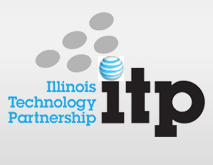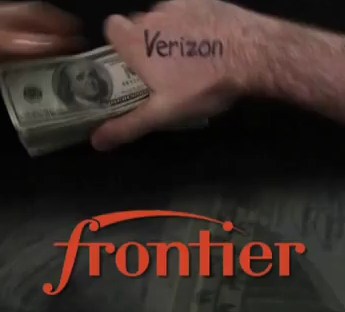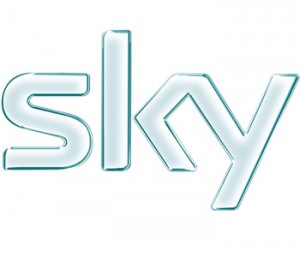 Illinois politics is business as usual — if you’re a high-powered business like AT&T, that is. They’ve just proven how easy it is to sucker the fifth largest state’s legislature and several newspaper editorial boards with a dog and pony show of promises that it will have few regrets (and no consequences) for breaking later on.
Illinois politics is business as usual — if you’re a high-powered business like AT&T, that is. They’ve just proven how easy it is to sucker the fifth largest state’s legislature and several newspaper editorial boards with a dog and pony show of promises that it will have few regrets (and no consequences) for breaking later on.
Once again, AT&T is upset about the terms it agreed to in efforts to rebuild its nationwide reach through frenzied mergers and acquisitions. This time it’s the 1999 merger with Ameritech. AT&T claims the promises its partner SBC made to state regulators to green-light the deal are now too hard to honor. If only you and I could lobby legislators to walk away from our own personal responsibilities. “I can’t pay my town taxes because the neighborhood has changed since I first moved here, so it would be unfair of you to ask.”
The argument apparently worked in the Illinois General Assembly which passed AT&T’s Get Off the Regulatory Hook Bill (Senate Bill 107) unanimously earlier this month. The bill has now been sitting on Governor Quinn’s desk for more than two weeks, and AT&T is getting nervous. Letters to the editor and AT&T-friendly editorials have started appearing in the Illinois press in a coordinated effort to beat the drum loud enough to get the governor’s attention to sign the bill unchanged.

Ameritech used to provide phone service to most of Illinois before being purchased by SBC Communications (later AT&T) in 1999.
Memories are short. The Illinois Commerce Commission established ground rules for AT&T precisely because its predecessor provided abysmal service in the state. As part of a hard-fought campaign to secure Ameritech, AT&T promised Illinois it would:
- provide reliable landline service in rural Illinois at a fair price;
- provide DSL broadband to at least 90 percent of Illinois customers;
- recognize that landline service remains an essential utility for millions of residents, many of whom don’t have the option of switching to another provider.
That was then, this is now.
These days, those requirements are apparently too tough on AT&T. The company complains Illinois residents can switch to Comcast phone service (from the Worst Company in America 2010) or sign up for cell phone service from AT&T or a few other providers, assuming one has reception. With all of this “competition,” AT&T argues there is no reason to continue regulating the company’s landline services, especially in rural areas AT&T could probably do without anyway.
Illinois is just the latest stop on AT&T’s big budget deregulation traveling circus, starring high-paid lobbyists and astroturf friends, all coordinating to unshackle their benefactor from pesky regulations.
The state’s legislature is evidently a million miles away from its fellow midwestern states who have been chauffeured down AT&T’s Promise Avenue before, only to discover it quickly became a one-way toll road for consumers. Ask Wisconsin.
AT&T’s Message — Less is more.
AT&T routinely promises less regulation will magically open the door for its much-coveted U-verse platform. Every elected official would love to claim he or she brought much-needed cable competition to their district, so promises of telco-TV are quite an incentive for legislators. The formula is simple — you deregulate us and we’ll bring more U-verse deployment to your state.

Illinois State Senator Michael Bond (D-31st District)
Politicians trip over one another running to the nearest microphone over promises like that.
“This legislation is the key to opening up investment in the telecommunications industry in Illinois,” said state Sen. Michael Bond. “By modernizing our system, we are showing providers that we are worthy of their investment.”
But hasn’t AT&T already made a trip to that well before? Last June, AT&T issued a press release crediting deregulation undertaken in 2007 for making U-verse expansion possible in Illinois:
AT&T U-verse is being expanded in Illinois thanks to legislation passed in 2007 and supported by State Senators Larry Bomke and Bill Brady and State Representatives Raymond Poe, Rich Brauer, Robert Flider and Bill Mitchell. The Cable and Video Competition Law provides an environment that encourages new video providers, such as AT&T Illinois, to invest in Illinois to compete against incumbent cable providers.
What will AT&T want next to finish U-verse deployment in Illinois – tax-free status?
That U-verse was designed to save AT&T’s landline business from a torrent of disconnect requests always gets missed by elected officials. Basic landline service over copper wire is a dying business. If AT&T doesn’t deploy U-verse, its ultimate destiny as a landline provider will be the horse and buggy industry of the 21st century. Regulators need not throw away valuable consumer protections to protect a multi-billion dollar company already well-aware of what it needs to accomplish to stay profitable.
What consumers end up with — Less service for more money.
Despite the flowery rhetoric that competition is breaking out all over Illinois, 78 percent of state residents continue to rely on landline telephone service. That numbers 6.5 million consumers. Among the well-represented holdouts are fixed income seniors, and for most of them, a $200 monthly deluxe triple-play package of services is out of the question.
For customers that cannot afford higher rates, the Illinois Citizens Utility Board fought for and won a three year rate freeze and reprieve for AT&T’s budget-minded Consumer’s Choice telephone packages that were slated to be discontinued. These packages don’t bundle unneeded calling features or extra services, instead providing affordable basic telephone service. But after three years, AT&T can cancel these packages and raise prices at will, particularly in rural areas where competition is minimal to non-existent. State oversight of AT&T is also history, leaving little recourse for consumers who suffer through poor service or AT&T’s legendary billing nightmares.
Supporters also promoted the deregulation legislation as a “jobs bill” — a ludicrous contention for legislation that contains no section pertaining to jobs. Perhaps they meant more jobs for AT&T’s lobbying crew. In fact, landline phone companies like AT&T are slashing jobs by the tens of thousands and will likely continue to do so.
Illinois Senate Bill 107 allows AT&T to set the stage to follow Verizon’s example — exiting rural areas, leaving the bulk of their investments and potential profits in large cities like Chicago.

The State Journal-Register wrote a shortsighted editorial supporting the proposed deregulation bill
Newspaper editorials like this one in the State Journal-Register in Springfield mean well but are breathtakingly short-sighted. The editorial staff gushes about the benefits U-verse will bring Springfield, without any evidence U-verse will actually be universally available in the community anytime soon:
On a less philosophical level, we believe the new telecom law will be beneficial to most Illinois consumers because it should promote competition for household cable TV, Internet and phone service. In markets like Springfield, it could allow AT&T and Comcast to go head-to-head throughout the city, not just in the few areas where AT&T’s U-verse service is now available. That’s what cable customers have been demanding for decades.
AT&T customers have learned not to hold their breath waiting. Any regular visitor to the company’s own support forums will quickly discover customers frustrated by lack of availability, hit or miss service, and no coverage map. One customer summed it up:
I have NEVER in my life had to fight so hard to spend money on something.
Not even my wife makes it this hard on me to get something.
I have NEVER in my life (aside from when I got my AT&T POTS service) had a company work so slowly to accomplish something to try and attract a perspective customer or keep a current customer.
But there’s more. Had the Journal-Register picked up the phone and checked with their neighboring states, they would have learned U-verse is not the competitive nirvana it’s routinely promised to be. In Wisconsin, rates for cable, broadband, and phone service continue to increase, not decrease. Most of the savings built into introductory packages for new customers expire after one year, and some providers limit the discounts to once per household. That means once your new customer discount package expires, you may never get it again. Then it’s a lifetime of ever-increasing pricing.
AT&T-backed bills also never require the company to completely wire every community for its U-verse service. The company can bypass neighborhoods, towns and villages, or buildings it feels are not cost-effective to serve. There are states that deregulated AT&T to their specifications and years later, communities are still waiting for service to reach their areas. Illinois will be no different, and if AT&T determines U-verse isn’t worth the investment in large swaths of southern Illinois, so be it.
The Citizens Utility Board is correct when it predicts most of the investment will end up in Chicago, even at the expense of other parts of the state. AT&T always follows the money.
AT&T’s Astroturf Friends Join the Parade

You have to look closely to see the connection. Who really is behind ITP?
AT&T’s friends are also writing letters to the editor demanding action, without disclosing they are bought and paid for sock puppets.
Take the Illinois Technology Partnership, which claims to represent a grand union of consumer and private interests for the betterment of Illinois’ high tech future. In reality, it’s yet another AT&T astroturf group that works against consumers.
Their claim:
The Illinois Technology Partnership is the Illinois-based project of Midwest Consumers for Choice and Competition, a non-profit organization of individual consumers interested in technology, broadband, and telecommunication issues with state projects throughout the Midwest region. ITP brings together industry experts, thought leaders, and Illinois consumers to foster an environment that will encourage emerging technologies, jobs, and investment, and spur economic growth on the state and local level.
Reality Check:
Both ITP and the ironically-named “Midwest Consumers for Choice and Competition” are both creatures of AT&T. Thad Nation, behind all of these groups, invents AT&T-supported astroturf campaigns in various states where the company delivers service. Over the past few years, Nation has cooked up TV4Us, Wired Wisconsin and Technology for Ohio’s Tomorrow, among others. But his real day job is the founder and senior partner at Nation Consulting, a politically-connected lobbying firm:
At Nation Consulting, Nation focuses on assisting corporate clients with strategic planning in government and public relations, and managing crisis communications.
Our team has worked on the “inside” of the offices of Governors, Congressional members, and state agencies. We’ve worked at every level of government, and we have the relationships necessary to help you navigate state and federal bureaucracies to accomplish your goals. We know how government works – and we know what government can do for you.
Getting government officials or bodies to do what you want isn’t easy. Government is inherently a slow, bureaucratic entity. When you want elected or appointed officials to change policy, you need a comprehensive plan – and the resources, relationships and quick-thinking to implement that plan.
We come to you with decades of experience in advocacy, moving legislators and engaging state agency leaders to action. Let us help you build and drive an aggressive advocacy agenda.
Regardless of your industry, the internet has a role to play in achieving your public relations goals – and we have the experience and the expertise to implement a plan suited to your needs. Whether you need to effectively use social networking sites, manage a blog, conduct email campaigns or use Web 2.0 tools, Nation Consulting can help you maximize your online presence in a way that is both cost-effective and beneficial to your business or organization.
Ordinary consumers can’t afford Nation Consulting’s services so he doesn’t work for them.
As usual, AT&T’s connections don’t end there. Many of the “partners” listed on ITP’s website are themselves also backed by AT&T — the Illinois State Black Chamber of Commerce and Illinois Hispanic Chamber of Commerce just two examples. Several of ITP’s partners follow Nation’s efforts wherever he goes, also ending up affiliated with his other astroturf projects.
A letter to the editor appearing in The Daily Herald signed by Lindsay Mosher, executive director of ITP, applauds the state legislature for passing AT&T’s custom-crafted deregulation bill:
This legislation will spur significant private investment, increase broadband access and create jobs for Illinois residents at no cost to taxpayers.
The legislature deserves our thanks for taking this step.
Now it’s up to Governor Quinn to finish the job and sign the bill without changes, as some have suggested.
As is too often the case, readers are done a disservice when a newspaper prints a self-interested letter to the editor or guest editorial without fully disclosing who is behind it. Mosher could have signed her letter “AT&T lobbyist” and been more honest. In fact, in addition to her position at ITP, she’s also employed by another Chicago lobbying firm — Resolute Consulting. It specializes in issue advocacy as well, and doesn’t work for free.
AT&T spends an enormous amount of money carefully crafting its issues advocacy campaigns designed to convince consumers they are representing your best interests. Wouldn’t using all this money to lower your phone bill and provide better broadband service be a better allocation of resources if, as AT&T claims, this is all to benefit consumers?
Here’s another question — if an individual consumer in western New York can expose all of these incestuous ties between supposedly grassroots consumer groups and the telecom companies and interests that fund them, why can’t the news media in Illinois? If they only followed the money, the real story about Senate Bill 107 could have been told before it sailed through the legislature unopposed.
Now, the only chance Illinois consumers have is if Governor Quinn loses the bill.


 Subscribe
Subscribe













